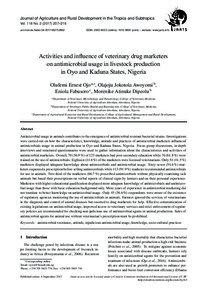| dc.date.accessioned | 2017-09-11T09:17:45Z | |
| dc.date.available | 2017-09-11T09:17:45Z | |
| dc.date.issued | 2017-09-06 | |
| dc.identifier.issn | 1612-9830 | |
| dc.identifier.issn | 2363-6033 | |
| dc.identifier.uri | urn:nbn:de:hebis:34-2017062752862 | |
| dc.identifier.uri | http://hdl.handle.net/123456789/2017062752862 | |
| dc.language.iso | eng | |
| dc.publisher | Kassel University Press | ger |
| dc.rights | Urheberrechtlich geschützt | |
| dc.rights.uri | https://rightsstatements.org/page/InC/1.0/ | |
| dc.subject | antimicrobial resistance | eng |
| dc.subject | attitude | eng |
| dc.subject | injudicious antimicrobial usage | eng |
| dc.subject | knowledge | eng |
| dc.subject | socio-cultural practices | eng |
| dc.subject.ddc | 630 | |
| dc.title | Activities and influence of veterinary drug marketers on antimicrobial usage in livestock production in Oyo and Kaduna States, Nigeria | eng |
| dc.type | Aufsatz | |
| dcterms.abstract | Antimicrobial usage in animals contributes to the emergence of antimicrobial resistant bacterial strains. Investigations were carried out on how the characteristics, knowledge, attitude and practices of antimicrobial marketers influenced antimicrobials usage in animal production in Oyo and Kaduna States, Nigeria. Focus group discussions, in-depth interviews and structured questionnaires were used to gather information about the characteristics and activities of antimicrobial marketers. Overall, 70 (56.9 %) of 123 marketers had post-secondary education while 76 (61.8 %) were trained on the use of antimicrobials. Eighteen (14.6 %) of the marketers were licensed veterinarians. Only 51 (41.5 %) marketers displayed adequate knowledge about antimicrobials and antimicrobial usage. Sixty-seven (54.6 %) marketers requested a prescription before selling antimicrobials while 113 (91.9 %) marketer recommended antimicrobials for use in animals. Two-third of the marketers (66.7 %) prescribed antimicrobials without physically examining sick animals but based their prescriptions on verbal reports of clinical signs by farmers and on their personal experience. Marketers with higher educational qualification displayed more adequate knowledge of antimicrobials and antimicrobial usage than those with basic education background only. More years of experience in antimicrobial marketing did not translate to better knowledge on antimicrobial usage. Only 45 (36.6 %) respondents were aware of the existence of regulatory agencies monitoring the use of antimicrobials in animals. Farmers ignored the services of veterinarians in the diagnosis and control of animal diseases but resorted to drug marketers for help. Effective communication of existing legislations on antimicrobial usage, improved access to veterinary services and strict enforcement of regulatory policies are recommended for checking non-judicious use of antimicrobial agents in animal production. Sales of antimicrobial agents for animal use without veterinarian’s prescription must be prohibited. | eng |
| dcterms.accessRights | open access | |
| dcterms.bibliographicCitation | In: Journal of Agriculture and Rural Development in the Tropics and Subtropics. Kassel : Kassel University Press. - Vol. 118, No. 2 (2017) S. 207-216 | |
| dcterms.creator | Ojo, Olufemi Ernest | |
| dcterms.creator | Awoyomi, Olajoju Jokotola | |
| dcterms.creator | Fabusoro, Eniola | |
| dcterms.creator | Dipeolu, Morenike Atinuke | |
| dc.description.everything | Gedruckte Ausg. im Verlag Kassel Univ. Press (www.upress.uni-kassel.de) erschienen. | ger |

